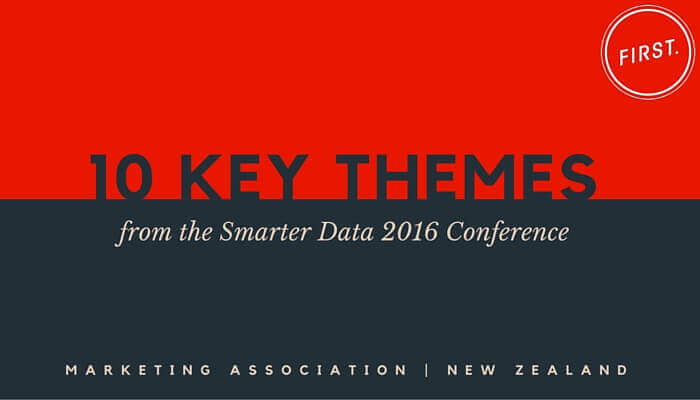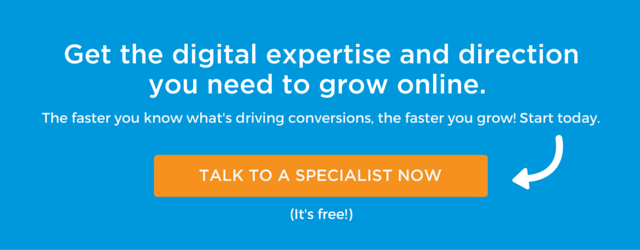Yesterday, FIRST attended the Smarter Data conference in Auckland. Hosted by the Marketing Association, this one-day event explored how marketers today can leverage data to transform or grow their businesses. It featured a diverse line-up of speakers from varies industries sharing their stories, insights and riffing on what a data-driven future looks like for marketing professionals.
Here are some of the key themes from the day:
The democratisation of data
Just as we’ve become a literate society, where most people can read and write, something similar is starting to occur with numerical literacy. Every-day marketers are learning how to access, explore and present data. New organisations like figure.nz are consolidating data from different sources – including companies, government and academia – and converting these into simple visualisations available to everyone.
The power of visualisations
Visualisations are a powerful way to communicate and tell stories. If done well, graphics are intuitive and convey complexity and subtle trends very effectively. While there are plenty of enterprise-level tools, such as Tableau and Qlik, their main benefits are around publishing, permissions and real-time reporting. For most of us, Excel is a great place to start and, if you have a coder in your team, there are also a growing number of open-source visualisation tools like D3.js.
Think lightning fast
For data to be most valuable in making decisions, it needs to be timely. In some industries, creating a report in minutes instead of hours is key to making it actionable. Work towards becoming agile, even if that means taking baby steps such as starting with a minimum viable product or just some of your data.
Sharpen your focus
“Without a clear goal we become strangely attracted to daily acts of trivia”. As a rule, rather than letting your data drive the agenda start with your problem or opportunity. Develop clear KPI’s that support your goal and then use these to shape your data collection and measurement.
Become an intrapreneur
Entrepreneurs are known for their resourcefulness and creativity. But how you can be smarter with data and solve problems within a company? As a thought experiment, what would you do if all your existing systems, networks and data disappeared overnight and you could re-imagine everything from the beginning?
Organisational change
Having data available is a good start, but to fully leverage it you need support from throughout your company. For example, a data-driven marketing initiative might require capabilities spanning data collection, storage, analytics, people to action the insights, tracking results and costing the entire exercise against incremental revenue. Strategy needs to be set at the top, enabling the organisational change required to fully leverage the data available.
Personas & Personalisation
Customers are increasingly expecting your marketing to be personalised. This is partly driven by exposure to leading global companies such as Amazon, Uber and Netflix, but also from highly personalised social media news-feeds. Marketers need to strike the right balance between personal (good) and intimate (spooky). Alternatively, disclose why you’re showing a customer a specific offer or simply allow your customers to configure their own experience.
Machine Learning
Demand for predictive marketing and machine learning services (modelling data to find out which products a customer is most likely to buy) is exploding, especially in the UK and US. While many companies see good conversion gains, in the region of 5%-15%, some such as Tesco have seen increases as high as 4x. Due to our fast adoption of technology, New Zealand is in a great position to capitalise on this emerging trend.
Data futures
More organisations will share data in order to fully unlock the social and economic benefits. This may include cross-governmental sharing, such as between the Companies Office and IRD, or from a product manufacturer to its retailers. The expectation is that our peers will provide a self-regulating environment for collecting and using data fairly and honestly. The consensus was that New Zealand companies are generally prudent in how they use customer data, possibly missing some opportunities as a result.
Self-driving cars
It’s expected that we’ll see autonomous vehicles out on our streets within 10-12 years, subject to regulatory approval. It was considered that Google is making a play towards developing the ‘Android’ for these vehicles, incorporating marketing opportunities into in-drive entertainment and other services. Other possibilities also include hired cars that reduce fares for diverting to a sponsors retail store and company branded cars that can pick up your pizza or drop you off at the airport and check in your bags.
Final thoughts
Despite all these great examples, a recurring theme from all speakers was that the opportunities with data are new to us all. There are no experts and we’re only just beginning to figure out what’s possible.
So, start where you are and good luck on your journey to getting smarter with data!


